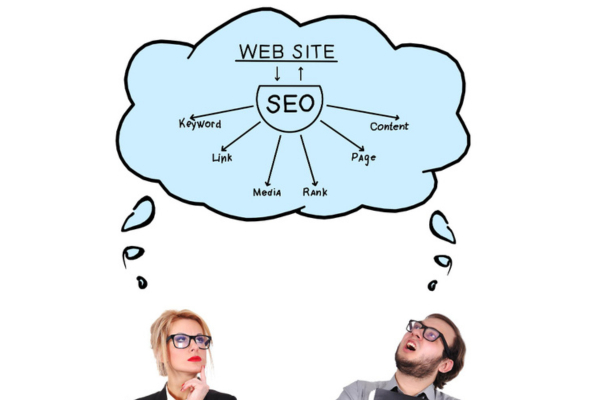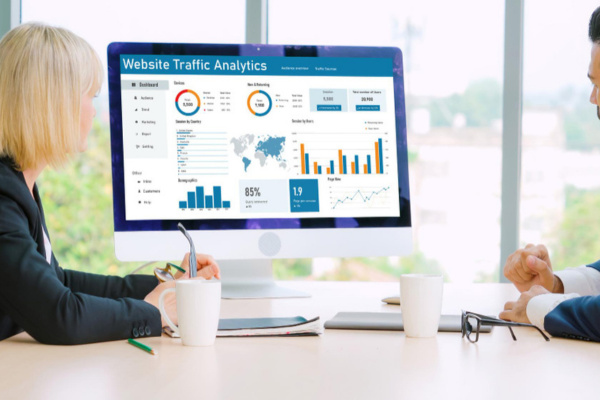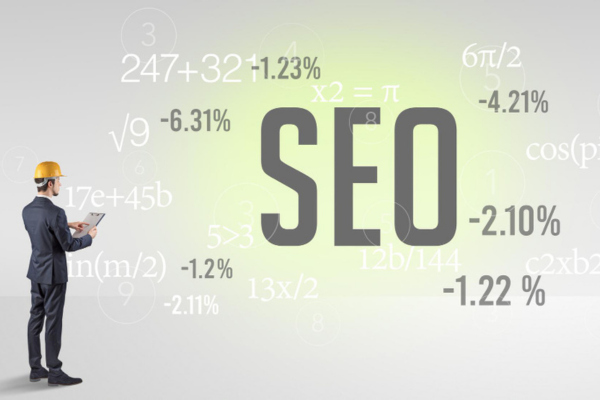Why SEO Is Important for Every Website in 2025
Why SEO Is Important for Every Website in 2025
In today’s digital-first world, simply having a website is no longer enough. Without proper visibility, even the most beautifully designed sites can remain invisible to potential visitors. That’s where SEO (Search Engine Optimization) comes in — a powerful tool that ensures your website is not just online, but actually found by the right people. As we move into 2025, SEO is more important than ever. With Google’s evolving algorithm, AI-generated content on the rise, and growing online competition, businesses that ignore SEO risk falling behind fast. Whether you run a personal blog, an eCommerce store, or a service-based website, investing in SEO is no longer optional — it’s essential. In this blog, we’ll explore exactly why SEO is important for every website in 2025, what benefits it brings, and how to use it effectively to grow your traffic, visibility, and business.

What Is SEO and How Does It Work in 2025?
In simple terms, Search Engine Optimization (SEO) means making your website visible to people who are searching on Google or other search engines. But why SEO is important for every website in 2025 goes far beyond just getting clicks. It’s now about being found, trusted, and chosen by the right audience in a competitive online world.
In 2025, search engines are much smarter. Google can understand the intention behind a search, not just the words. That means websites must focus on user experience, mobile optimization, and high-quality content. If your site loads slowly or doesn’t provide value, it won’t rank, no matter how many keywords you use.

Think of SEO like placing your shop on the main road instead of a hidden alley. Without SEO, people won’t even know your website exists. But with proper optimization, you can attract real visitors, increase your brand value, and grow consistently.
Want to learn more about improving your pages? Visit our On-Page SEO Services to get started.
How SEO Impacts User Experience and Trust
In 2025, why SEO is important for every website has shifted from being just about ranking high to being about delivering a quality user experience. A website’s user experience (UX) and trustworthiness are crucial factors that determine whether or not users will engage with the content, stay on the site, and eventually convert into loyal customers or clients.
User Experience: The Heart of SEO
User experience is a top priority for search engines like Google. Google’s algorithms have evolved to focus heavily on how users interact with a website. The more positive the interaction, the better the chances of higher rankings. This means that if your website is difficult to navigate, slow to load, or not mobile-friendly, Google will penalize it by lowering its rank.

SEO directly impacts UX by optimizing a website’s speed, mobile usability, and overall structure. For instance, optimizing images, using clean code, and enhancing page load speed can significantly reduce bounce rates — the percentage of users who leave a website quickly. Google takes note of these metrics, and higher engagement leads to better rankings.
Responsive design is another factor here. In 2025, mobile-first indexing is the standard, meaning that Google ranks websites based on their mobile version first. If your site isn’t responsive, you’ll miss out on organic traffic. By improving mobile usability, SEO ensures that visitors have an optimal experience, whether they’re browsing on a smartphone, tablet, or desktop.
Trust and SEO: Building Credibility with Google and Users
SEO also plays a key role in building trust with both users and search engines. Websites that rank well typically appear more credible to users. But trust doesn’t come from just good content — it comes from authority.
A major component of SEO is backlinking, where other trusted websites link to yours. These high-quality backlinks act as votes of confidence from credible sources. The more authoritative the backlinks, the more Google trusts your site. This, in turn, improves your rankings and builds trust with your audience. Learn more about SEO backlinks to enhance your site’s credibility.
Content is also critical for trust. To rank well in search engines, you need to create content that is valuable, relevant, and authoritative. This is why content optimization is so important. If your content is genuinely helpful to your audience, it builds trust, increases engagement, and encourages return visits. Quality content is the foundation of both SEO and trust-building.
How SEO Impacts Local Trust
Local SEO plays a critical role in building trust with local audiences. For example, if you’re running a local business, having a Google My Business (GMB) profile and optimizing it properly ensures that you show up in local searches. This enhances trust because users know that they are interacting with a legitimate business in their area. Learn how to optimize GMB for better local visibility.
Adding local reviews to your site can also build trust. Positive reviews on platforms like Google or Yelp can significantly impact your reputation and help improve local SEO. Customer testimonials and case studies also contribute to building trust, showing potential customers that real people have benefited from your services.
How SEO Affects Your Website’s Ranking and Traffic
When we talk about why SEO is important for every website in 2025, it all comes down to one key point: visibility. The ultimate goal of SEO is to ensure that your website ranks higher on search engine results pages (SERPs). Higher rankings mean more visibility, which directly leads to more traffic. But the impact of SEO on ranking and traffic isn’t limited to just page rank — it also includes the quality and relevance of the traffic you get.
How SEO Affects Your Website’s Ranking
SEO plays a pivotal role in determining where your website appears on search engine results.

Search engines like Google use complex algorithms to assess and rank websites based on several factors, including content relevance, user experience, backlinks, and website structure. These factors all come together to decide which websites should rank higher for a specific query.
In 2025, SEO isn’t just about optimizing for keywords. The algorithms prioritize websites that offer high-quality content and a user experience. This means that optimizing for user intent — understanding what the searcher is really looking for — is crucial. When you target the right keywords, optimize your content, and improve user experience, your website’s ranking improves. As a result, you get more organic traffic, and your site becomes more visible to people searching for services or products you offer.
SEO’s Impact on Organic Traffic
Organic traffic refers to visitors who find your website naturally through search engines, without the need for paid ads. SEO is the primary driver of organic traffic. When you rank higher in search engines, more users click on your website link. Studies show that the first page of Google captures 91.5% of traffic, with the top three results getting nearly 40% of all clicks.
SEO drives this organic traffic through the right combination of on-page optimization (like meta descriptions, header tags, and image alt text) and off-page optimization (like backlinks and social media signals). If your website is properly optimized for search engines, it is more likely to show up in the top positions of the search results.
Not only does SEO increase traffic volume, but it also helps attract more targeted visitors — people who are actively searching for the products, services, or information you offer. This means that the traffic you receive from SEO is more likely to convert into leads and sales. For example, if you run an online store and you rank for specific product keywords, the traffic you attract will be highly relevant and more likely to make a purchase.
Boosting Website Traffic with Local SEO
Local SEO is another critical factor that affects ranking and traffic. Local SEO helps businesses show up in local searches when users look for nearby services. For example, if you run a restaurant in New York, local SEO helps you appear when people search for “restaurants near me” or “best restaurants in New York.”
By optimizing your Google My Business (GMB) profile, gathering local reviews, and building local backlinks, you can improve your rankings for location-based searches. This will boost your local visibility and increase traffic from people in your area. Learn more about local SEO optimization here.
Internal Linking and SEO
One often overlooked but essential part of SEO is internal linking. Linking to other pages on your website can boost your SEO by helping search engines crawl your site better and increasing the time users spend on your pages. Internal links also help distribute link equity (or “link juice”) throughout your website, ensuring that important pages get more visibility.
For instance, you can link relevant blog posts to product pages or service pages. This not only helps users find related content easily but also enhances your SEO strategy by boosting the visibility of high-priority pages.
How to Optimize Your Website for SEO in 2025
As we move further into 2025, website optimization for SEO has become more intricate and essential than ever. With search engines continually evolving, it’s no longer enough to simply insert keywords into your content. SEO optimization now involves several complex strategies that cater to both the technical and content aspects of your site. Here’s a comprehensive guide on how to optimize your website for SEO in 2025:
1. Prioritize Mobile-First Indexing
One of the most significant changes in SEO over the past few years has been the shift to mobile-first indexing.

Google now uses the mobile version of a website for ranking and indexing. If your website is not optimized for mobile devices, you’re likely losing valuable search engine rankings and, consequently, traffic.
To ensure that your website is optimized for mobile, start by checking whether your site is responsive. A responsive design ensures that your website adapts seamlessly to different screen sizes, providing a smooth experience for visitors, whether on a desktop, tablet, or mobile device.
2. Optimize Website Speed
Page speed has been a ranking factor for years, and in 2025, it’s more critical than ever. Fast-loading websites are not only favored by Google, but they also offer a better user experience. Slow-loading pages increase bounce rates and reduce user engagement, negatively affecting your SEO.
To improve website speed, you can:
- Compress images
- Minimize JavaScript and CSS files
- Leverage browser caching
- Use a Content Delivery Network (CDN)
By implementing these strategies, you’ll enhance user experience and boost your site’s SEO performance. Check out Google’s PageSpeed Insights for more tips on improving your website’s speed.
3. Optimize for User Intent
Understanding user intent is paramount for SEO in 2025. When optimizing for SEO, it’s not just about using the right keywords — you must also align your content with what the user is actually searching for.
User intent falls into three primary categories:
- Navigational intent: The user is looking for a specific website or page.
- Informational intent: The user is looking for information or answers.
- Transactional intent: The user intends to make a purchase or complete an action.
By targeting the right user intent and creating content that directly answers user queries, you increase the chances of your website ranking higher in search results. Focus on creating comprehensive, high-quality content that meets the user’s needs. Learn more about search intent and how to optimize for it in this comprehensive guide.
4. Improve On-Page SEO
On-page SEO is still one of the most important aspects of SEO optimization in 2025. Focus on the following:
- Title Tags and Meta Descriptions: Ensure your title tags are compelling and contain your target keyword. Meta descriptions should be concise and summarize the content effectively.
- Header Tags: Use H1, H2, H3, etc., to structure your content and improve readability.
- Alt Text for Images: Include descriptive alt text for every image, which helps search engines understand the context and relevance of the image.
- Internal Linking: Linking to relevant pages on your site keeps users engaged and helps search engines crawl your site more efficiently.
By optimizing these on-page elements, you improve both SEO ranking and user experience.
5. Build High-Quality Backlinks
Backlinks remain one of the most influential ranking factors in 2025. The more quality backlinks your website has, the more authoritative and trustworthy Google perceives it. Focus on getting backlinks from high-quality, relevant websites in your niche.
Guest blogging, social media promotion, and building relationships with influencers can help you earn backlinks. Avoid low-quality backlinks that could harm your SEO efforts.
The Future of SEO: What to Expect in 2025 and Beyond
SEO is constantly evolving, and as we move into 2025, the world of digital marketing is expected to see even more changes. Search engines are becoming smarter, and user expectations are evolving rapidly. To stay competitive, businesses must adapt to new trends and technologies in the SEO landscape. Here’s a look at what to expect in SEO in 2025 and beyond:
1. AI and Automation in SEO
Artificial intelligence (AI) and machine learning are already making waves in SEO, and this trend will only intensify in 2025.

Google’s RankBrain and other AI algorithms are already helping to determine search rankings based on user behavior and engagement. In the coming years, AI-powered tools will play a larger role in content creation, optimization, and analysis.
By 2025, AI-driven platforms will likely become indispensable for automating repetitive tasks, such as keyword research, content recommendations, and backlink analysis. AI tools will also help businesses predict search trends and provide insights into user intent more accurately.
If you’re already using AI tools for SEO, it’s important to stay up-to-date with the latest developments. Check out this guide on AI in SEO to learn more about how AI can improve your website’s performance.
2. The Rise of Video Content
Video content is expected to dominate in 2025. Video optimization for SEO is no longer optional — it’s a necessity. Google increasingly prioritizes video results in search engine results pages (SERPs), and platforms like YouTube are becoming integral to SEO strategies.
To capitalize on this trend, businesses need to focus on optimizing video content with relevant keywords, descriptions, and tags. Additionally, using video snippets and rich results will help your video content rank better on search engines. If your website isn’t integrating video content yet, it’s time to start considering it as part of your SEO strategy.
3. Increased Focus on Local SEO
As people search for services near them or for businesses with a physical presence, local SEO will continue to grow in importance. In 2025, Google My Business (GMB) optimization, local citations, and positive local reviews will be critical for businesses looking to maintain their visibility in their respective regions.
The focus on location-based searches will only increase, and businesses must optimize for location keywords and provide accurate, up-to-date information to improve their local SEO rankings.
4. Mobile-First and Voice Search Optimization
Mobile-first indexing is now the standard, but in 2025, we can expect even more focus on mobile user experience. Websites that offer a seamless mobile experience will have an advantage in rankings. This also means that your website should be optimized for voice search, as more users will use voice-activated devices like smartphones, smart speakers, and virtual assistants to search the web.
Voice search queries are typically more conversational, so businesses must optimize for long-tail keywords and question-based queries. If you haven’t yet considered optimizing for voice search, now is the time.
5. E-A-T and Core Web Vitals
Google’s focus on E-A-T (Expertise, Authoritativeness, and Trustworthiness) will continue to be a top priority for SEO in 2025. Websites that demonstrate authority and trustworthiness in their field will rank higher. This means that businesses need to build their brand reputation, create high-quality content, and earn relevant backlinks.
In addition to E-A-T, Core Web Vitals — metrics related to loading speed, interactivity, and visual stability — will be critical for SEO in 2025. Websites that score well on these factors will enjoy better search rankings and improved user experience.
